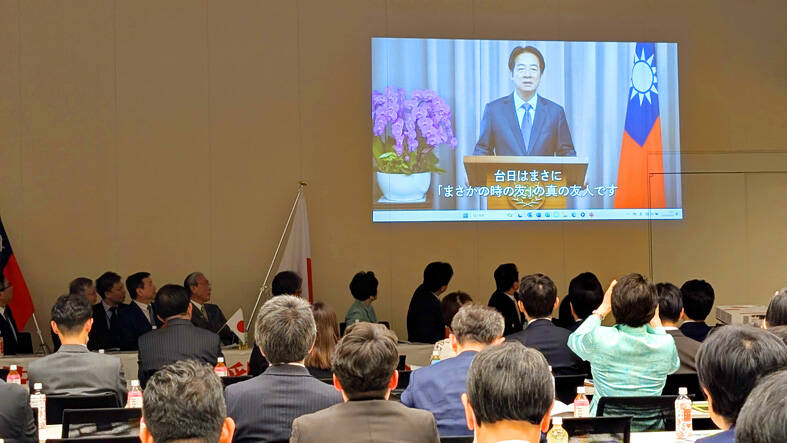Japan must prevent a Taiwan contingency from happening, a group of pro-Taiwan Japanese lawmakers from multiple political parties said in a joint resolution on Wednesday.
Tokyo must do all in its power to avert a conflict in the Taiwan Strait, Japanese lawmakers said in the annual agenda of the Japan-ROC Diet Members’ Consultative Council.
A Taiwan contingency is a Japan contingency, the lawmakers said, echoing a phrase coined by former Japanese prime minister Shinzo Abe.

Photo: Lin Tsuei-yi, Taipei Times
Japanese Representative Keiji Furuya, who heads the council, said Japanese lawmakers are already working on organizing an in-person security summit between Taiwan, Japan and the US.
The meeting can take place in person, as the COVID-19 pandemic is no longer an issue, unlike the past two summits, he said.
The council would send a delegation to attend Double Ten National Day events this year, as is customary, Furuya said.
This year’s trilateral summit is tentatively scheduled to take place in Taiwan sometime during the summer, ahead of Japan’s House of Representatives elections, Sankei Shimbun reported.
Japan should continue supporting Taiwan’s bid to join international organizations, including Interpol, the World Health Assembly, the International Civil Aviation Organization and the Comprehensive and Progressive Agreement for Trans-Pacific Partnership, they said.
The lawmakers also voted to establish a Taiwan-Japan economic exchange project team aimed at boosting bilateral trade and promoting pop culture exchanges including anime and manga, they said.
President William Lai (賴清德) in a video recording thanked the Japanese lawmakers for their support by allowing Taiwan to be listed as place of origin in Japan’s household registration system.
Lai highlighted shared challenges, including a shifting geopolitical landscape, climate change and economic uncertainty, adding that Taiwan and Japan could weather the storm only by cooperating “hand-in-hand and heart-to-heart.”
“We hope, in the face of expanding authoritarianism, to work closely with Japan to jointly build non-red supply chains,” he said.
“We hope to stand firmly together to exert our strength as we collectively safeguard our democratic values and promote regional peace, stability and prosperity,” he added.
The council’s influence has ebbed and waned from a height of more than 300 members to a nadir of 188.
The council’s current membership is 288, making it one of the largest all-party groups in the Diet.
Japan’s top representative to Taiwan yesterday said that both sides need to work closely to respond to economic and security challenges brought by US President Donald Trump’s new administration.
At an event in Taipei to mark the 15th anniversary of the establishment of the Taiwan Society of Japan Studies, Japan-Taiwan Exchange Association Taipei Office Chief Representative Kazuyuki Katayama said deepening Japan-Taiwan economic and technological cooperation has attracted increasing global attention.
Japanese companies and their Taiwanese counterparts have “inseparable connections” spanning mutual investments, research and development, and talent exchanges, Katayama said.
Japan and Taiwan face mutual security and economic challenges due to an increasingly complex global situation and East Asia policies “that deserve careful evaluation” from the Trump White House.
This means Japan and Taiwan need more “sophisticated responsive measures,” he said.

Right-wing political scientist Laura Fernandez on Sunday won Costa Rica’s presidential election by a landslide, after promising to crack down on rising violence linked to the cocaine trade. Fernandez’s nearest rival, economist Alvaro Ramos, conceded defeat as results showed the ruling party far exceeding the threshold of 40 percent needed to avoid a runoff. With 94 percent of polling stations counted, the political heir of outgoing Costa Rican President Rodrigo Chaves had captured 48.3 percent of the vote compared with Ramos’ 33.4 percent, the Supreme Electoral Tribunal said. As soon as the first results were announced, members of Fernandez’s Sovereign People’s Party

MORE RESPONSIBILITY: Draftees would be expected to fight alongside professional soldiers, likely requiring the transformation of some training brigades into combat units The armed forces are to start incorporating new conscripts into combined arms brigades this year to enhance combat readiness, the Executive Yuan’s latest policy report said. The new policy would affect Taiwanese men entering the military for their compulsory service, which was extended to one year under reforms by then-president Tsai Ing-wen (蔡英文) in 2022. The conscripts would be trained to operate machine guns, uncrewed aerial vehicles, anti-tank guided missile launchers and Stinger air defense systems, the report said, adding that the basic training would be lengthened to eight weeks. After basic training, conscripts would be sorted into infantry battalions that would take

GROWING AMBITIONS: The scale and tempo of the operations show that the Strait has become the core theater for China to expand its security interests, the report said Chinese military aircraft incursions around Taiwan have surged nearly 15-fold over the past five years, according to a report released yesterday by the Democratic Progressive Party’s (DPP) Department of China Affairs. Sorties in the Taiwan Strait were previously irregular, totaling 380 in 2020, but have since evolved into routine operations, the report showed. “This demonstrates that the Taiwan Strait has become both the starting point and testing ground for Beijing’s expansionist ambitions,” it said. Driven by military expansionism, China is systematically pursuing actions aimed at altering the regional “status quo,” the department said, adding that Taiwan represents the most critical link in China’s

EMERGING FIELDS: The Chinese president said that the two countries would explore cooperation in green technology, the digital economy and artificial intelligence Chinese President Xi Jinping (習近平) yesterday called for an “equal and orderly multipolar world” in the face of “unilateral bullying,” in an apparent jab at the US. Xi was speaking during talks in Beijing with Uruguayan President Yamandu Orsi, the first South American leader to visit China since US special forces captured then-Venezuelan president Nicolas Maduro last month — an operation that Beijing condemned as a violation of sovereignty. Orsi follows a slew of leaders to have visited China seeking to boost ties with the world’s second-largest economy to hedge against US President Donald Trump’s increasingly unpredictable administration. “The international situation is fraught